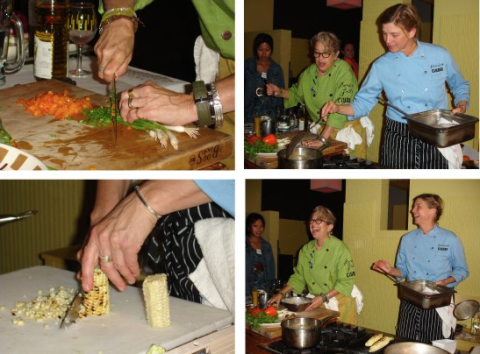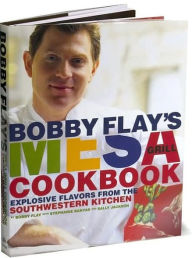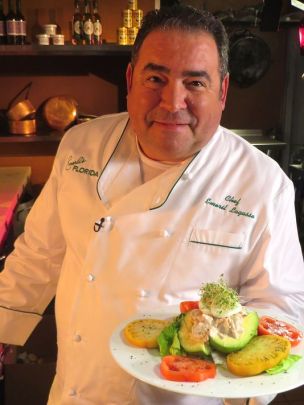Thanks for reading the five previous posts about Empathy (Introduction, Empathy #1, Empathy #2, Empathy #3 and Empathy #4).
A few days ago, my wife, son and I were watching Diners, Drive-Ins and Dives on the Cooking Channel™. I mentioned to my son that shortly after we were married some 25 years ago, his Mom and I enjoyed many evenings watching cooking shows on the Food Network channel: Emeril Lagasse's The Essence of Emeril, Mario Bateli's Molto Mario, Susan Feniger and Mary Sue Milliken's Too Hot Tamales, and my favorite The Iron Chef. Even though my wife joked that this is what caused us to be 400 lbs. (thankfully an exaggeration) we, and many others have all benefitted from Chef Leslie's creations through the years.
As I think about the cooking shows we watched, it never ceased to amaze me how these world renown chefs, being led by their heart and by their training, created beautiful and sumptuous dishes by combining the right ingredients in a creative yet sequential manner. It still amazes me when I see the chefs, bakers and contestants prepare fabulous dishes in a manner of minutes during which they steamed and simmered, seasoned and sautéd, stirred and scored vegetables, meats, fruits and other items. After viewing their creations, I was usually left saying "wow,""that's remarkable" or simply "mmmm, wish I could taste that!"
When I think about it, "cooking up Empathy" is a lot like this as well. With the right combination of specific "ingredients," I think its possible to create something that is not only appealing to the senses, but is edifying, empowering and is savory to the heart and spirit as well.
You may be thinking "but I'm not a 'Master Chef' and there's no way that I could create empathic moments that facilitate understanding, healing and resolution in a matter of minutes." I respectfully beg to differ.
I encourage you to approach the subject of creating Empathy much like the approach you would take if you were preparing a delicious meal for your spouse, friend or partner. What are the necessary steps that you would take? What comments would you make or what behaviors would you employ if you wished to create and deliver empathy? What are the staple "ingredients" of empathy and which ingredients are "a must" if you are going to achieve the therapeutic result that is edifying and meaningful to your spouse? What would your unique process look and "taste" like? Have you discovered a "secret ingredient" which when added at the right time, would turn a bland process into a winning outcome? Seen in this manner and approached in this way, do you think you could prepare an empathetic response by following a step-by-step course of action, adding the right ingredients at the right time, in the right amount to obtain the appropriate effect? If so, then before you know it, you'll be an Empathy grill master!
Lord knows (and my wife and son do too) I'm not a chef in the Kitchen but I do know that everyone cooks a grilled cheese, a pot roast or nutritious and delicious soups differently, with a lot of experimenting and practice along the way to prepare the meal just the way you like it. Cooking and serving up Empathy is a lot like this as well. Whether you are following a "recipe" or experimenting with your process, I encourage you to use the ingredients that you know will help you to create and obtain the result and outcome that matters with your spouse.
So what are the ingredients of Empathy? I have defined a few below for your consideration. As with any dish, you may not need nor will you use all of them, but it is important to become familiar with them and to stock them in the cupboard of your mind and heart so that you have them when you need them. Some of the "ingredients" of Empathy are:
- Compassion: Compassion is one of the primary or "staple" ingredients of Empathy. Compassion infers demonstrating speech and behavior that is tender, kind and is considerate of the "innards" (literally the heart and other vital organs in the trunk of a person). Remember, to the Greeks, the heart was the seat of the emotions, and empathy is your attempt to understand the heart and the emotions of another.
- Safety: We add Safety because it promotes calm, which promotes communication, which promotes connection and reconciliation in a relationship. Adding Safety to an encounter also reflects that we value and respect the physical, emotional, spiritual, talking and listening boundaries of others. Like adding liquid to any recipe, safety is a must in the empathetic process.
- Sympathy: Sympathy infers that we try to feel what the other person is feeling, right then and there. Its possible that your partner could be grieving or suffering; can you identify with his/her grief, loss or suffering experience? Demonstrating sympathy is a lot like trying to understand what may be impacting your spouse, then providing the appropriate response that the situation deserves.
- Love: Love is a "binder" in any encounter that you wish to create with another person. Love reflects the distinct characteristics of Esteem, Favor, Honor, Acceptance, Respect and Devotion (to name a few) when we practice it. Empathy will take on a greater quality, consistency and substance when these characteristics are added. Think about these words; define them and then attempt to practice them, or, ask your spouse/partner what would the behavioral manifestation of these characteristics look like to them, then, as you are able, try to provide them within reason.
- Mercy: Mercy means we engage in a process where our contribution to the situation and/or person is to relieve distress, ease misery and to provide reasonable responses to alleviate the suffering of a person. To this end, Mercy is a valuable ingredient because it not only is the concrete expression of pity and compassion if your spouse is feeling hurt or devastated, but the practice of Mercy also facilitates psychological and physical healing. Keep Mercy close by!
- Touch: The right amount of touch(ing) at the right time for the right reason promotes connection, care and love as you endeavor to serve up Empathy. A safe, warm, tight hug at the right time promotes reconnection and reassurance between you and the recipient. It also helps a person to feel noticed, loved, anchored and valuable, which are important outcomes in the empathetic process.
- Understanding: Understanding is another key staple of Empathy, as it infers you are asking questions and engaging in dialogue to thoroughly know the viewpoint(s) of your partner. Understanding is a compound word (“ Together” + “to put”), and the meaning of the Greek word speaks about your engagement in a process with each other to hear, perceive and comprehend, presumably with whatever issue you are both struggling through or working on. The meaning of the second part of this word (“ to put”) describes the collecting together of the individual features of an object into a whole, as if you are collecting pieces of a puzzle and putting them together (so that you both see the picture). This word also means that reflection, pondering and “laying to the heart” (letting it sink in, deeply getting it and demonstrating you got it) is to occur in your process and is a result of your process also. Could you see how your integrating this "ingredient" could help to facilitate Empathy as you endeavor to work to understand each other?
- Grace: Sometimes we just need a little grace from each other, or, we need to give grace to the other. The demonstration of Grace literally means to engage in behavior that causes and creates joy, pleasure and delight in your life and in your relationships, marriage or otherwise. It is used with some latitude to mean gratification, thankfulness, or appreciation for a kindness that is granted or desired. It also describes favors done without expectation of return. What does the demonstration of grace look like in your life? Who needs to receive it the most? How could your Empathetic process be strengthened if Grace is demonstrated one to another?
- Peace: Peace is achieved when we lay aside wrathful behaviors (in our speech, mannerisms and body language) and look to impart behavior that facilitates calm, connection and safety. If combined with Safety, outcomes where healing is needed have a better chance to occur due to your work to eliminate any toxic behavior in the soil of your relationships and your marriage.
- Collaboration: Collaborators or "Co-Laborers" as I use the word, find ways to use their personal energy to identify what is going on, then, within reason, they use their energy to take ownership and responsibility to create negotiated and meaningful outcomes. Collaborators don't misuse their power or energy in destructive ways with each other. On the other hand, they work and communicate together to deal honestly and responsibly with their emotions, their needs and their expectations. Typically, when Collaboration is added to the Empathetic process, you are more apt to experience a win-win outcome in your interactions with each other because Equality and Empowerment are unique flavors of Collaboration.
- Patience: From time to time, most dishes you prepare may call for you to add a little salt. Patience, like salt, is a critical ingredient of Empathy, because it not only gives Empathy flavor, but woven into the meaning of the word is our response to another which demonstrates we care about them. Why is that so? Because the Latin word Patiens means "I am suffering" (which is why we call the person in the hospital in need of some form of care, a Patient). So what is the reasonable form of care, attention, help or service that you could you render to the person who is suffering and is in need of an empathetic response called Patience?
- The Secret Ingredient: What is your "secret ingredient," which when used helps you to put the "wow" factor back in the outcome of your Empathetic process? What I have seen that makes one spouse sit up and take notice of the growth and maturation of the other is the skillful demonstration and application found in "Visiting the Gallery of the Heart" (Empathy #1). By visiting the Gallery of the heart of another, you are thoughtfully using speaking, listening and observation skills to take in the experience of the other, make sense of it, which will hopefully prompt you to deliver an appropriate response. This is truly a skill and demonstration of Empathy. However, since you know or are endeavoring to know your spouse, what have you learned about him/her that helps the two of you to re-engage with each other and maintain closeness, warmth and connection? Keep that ingredient close by!
So what about some applications here!
Application: In my mind's eye, this is the counsel these renown chefs would offer to us about creating Empathy (Show titles are in bold italics):
How to Boil Water (Jack Hourigan and Tyler Florence)

I started at this point and some of us may start here as well. When it comes to cooking up empathy, we don't know where to start nor do we have a whole lot of knowledge about the subject and what it takes to create and deliver empathy. Don't worry. What have you read in the previous posts and this one that has helped you to gain insight about Empathy? I encourage you to review the "recipes" and keep coming back to the Kitchen versus fearing the heat you may encounter within the Kitchen.
Too Hot Tamales (Susan Feniger and Mary Sue Millikan)

Susan and Mary demonstrated a synergy when you saw them creatively working together and delivering Empathy is a lot like that as well. Think about it; If the Victim in the Good Samaritan story refused the help offered to him, he would have remained in his "victim status," continually feeling his pain. With Empathy, you'll both have to work together to identify where are the hurts and what changes in your situation will help one or both of you to feel better. When you both take equal responsibility to do the work to be vulnerable (safety is a given here) then you are well on your way to creating resolution.
Throwdown! With Bobby Flay (Bobby Flay)

If it ain't broke, don't fix it! In the early days of the Food Network, Bobby prepared meals that reflected his strong points and his specialty area, which is Southwestern cuisine. Regarding Empathy, I would encourage you to gravitate toward your strong points and do the things that you already do well. If you're a great listener, listen. If you ask questions that help you to gain insight and information regarding how to proceed, then ask questions. If you provide a quiet strength, soft touch and eye-to-eye contact that helps the other person to feel safe, then practice that which facilitates connection. You can always add some of the other ingredients of Empathy to accentuate what you do best, but by all means, lean upon and practice your strengths.
The Iron Chef (The "Chairman" Mark Dacascos and Alton Brown)

There was always a "secret ingredient" that was the theme the Master Chef's needed to integrate into their work. Everyone had to work together and be creative to incorporate the secret ingredient into each of the dishes they prepared. Is your secret ingredient Love, Understanding or Compassion? Perhaps it is a spiritual discipline like Prayer, Worship or Fellowship (especially the Serenity Prayer)? Perhaps it is a slogan ("Easy Does It," "Think about your Thinking," "There are no mistakes, just learning experiences") or a Bible verse that you practice. Whatever your secret ingredient is, I encourage you to keep it close by. It works if you work it!
The Essence of Emeril (Emeril Lagasse)

Emeril aways worked for the "BAM!" statement with his dishes, symbolizing that he gave his very best in the preparation process to achieve the best possible outcome he could achieve with the meal he was preparing. You could see him thinking and using his knowledge carefully, skillfully and sequentially as he worked to create visually beautiful and delicious meals for the audience. I think Emeril would want us to work for the "WOW" statement in our effort to create and deliver Empathy with one another. That means learning about how the combination of these ingredients delivered in the appropriate measure will yield an outcome that leaves your spouse or partner thinking or saying "wow" at your contribution to the Empathy and quite possibly the healing experience one or both of you may need. Work for the "wow," but be content with making progress in your work, not perfection.
Thanks for being willing to take this journey with me to discover what Empathy is and how to effectively grow it and to deliver it. Future posts on Empathy will be labeled “Empathy #6,” “Empathy #7” and so on.
Also, thanks for visiting and please visit the other blogs written by Dr Ken McGill: Daily Bread for Life and “3 – 2 – 5 – 4 – 24″ for additional information that could be helpful. I welcome your comments below or via email and your favorites, your retweets and your “+1’s” if you have a brief moment and find the information helpful. Again, it is my desire to provide the very best info for your consideration.

No comments:
Post a Comment